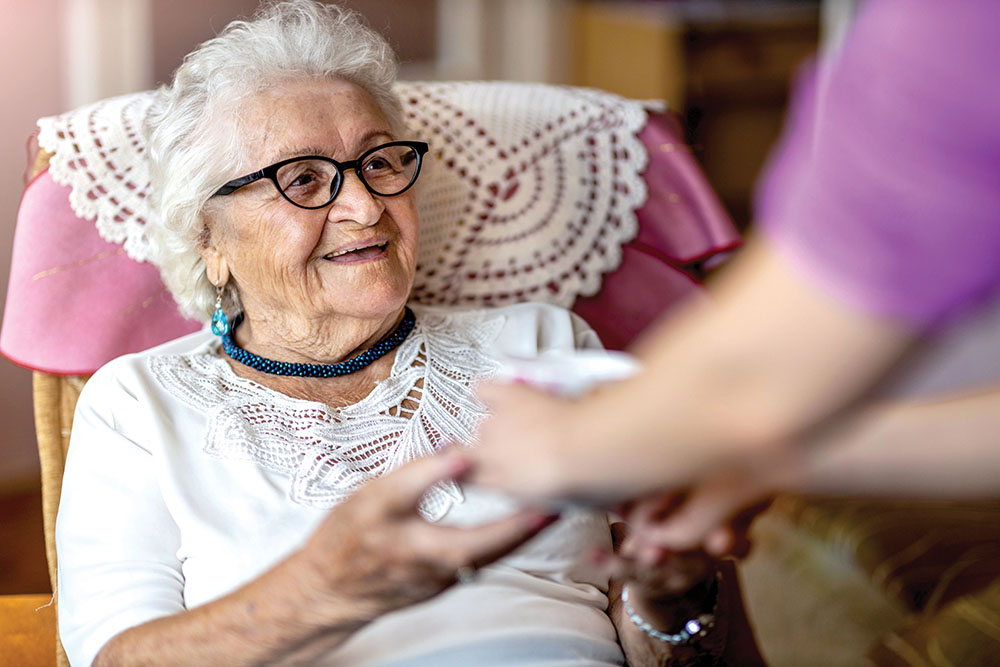Submitted by Annette Morrison, CRS-A/D, M.S., CCSI Case Coordination LLC
Jenny wasn’t prepared for the way mom refused to get dressed for her doctor’s appointment at 9am. Geraldine normally moved slowly, but this morning—the one morning they didn’t have time to waste—she was stubbornly refusing to get ready while doing silly things. She spread toothpaste all over the mirror, drawing a picture and then rolled up yards of toilet paper and stuck it in her pants. Jenny tried so hard to be patient and not lash out in anger at her mom. Jenny finally dropped her keys on the kitchen table and plopped into one of the worn wooden chairs, holding her head in her palm and giving in to the tears of frustration. “How am I ever going to keep doing this?” she thought to herself.
In 2019, the Centers for Disease Control published an article stating that one out of every three women and one out of every four men in the United States were informal caregivers to a friend or family member. This article, titled, “Caregiving for Family and Friends—A Public Health Issue,” highlights the increasing prevalence of the caregiving roll and the health consequences for the caregiver due to a change in prioritizing their loved one over themselves. Like most people who have taken over helping care for loved ones, Jenny relied on her experience with parenting to adapt to the tasks she was having to do for her mother, Geraldine, who was diagnosed with Alzheimer’s two years ago. Her parenting skills didn’t include knowing how to deal with hallucinations, her mom’s inability to find words to communicate, the angry outbursts, and strange mood swings. She was floundering under the onslaught of new territory and dealing with her own difficult emotions.
As caregiving roles become more common, programs are being developed to help take the pressure off, help caregivers understand their role, and to prioritize needs—a consultation offered through a type of specialist called a Caregiver Advisor. Caregiver Advisors help caregivers find providers, resources, learn skills, and help them work smarter to capitalize on the time they do have to commit to the task. Time is the number one resource that caregivers say they never have enough of and CCSI Caregiver Advisors recognize the time commitment and intensity of the caregiving role and the tole it takes on the caregiver. Every program we have focuses on making the best use of the resources a caregiver has and leading them to new ones through education and caregiving skills development.
There are many evidenced-based classes to help caregivers learn skills to help them decompress their role, but these classes also take a two-hour, regular commitment for a series of weeks. Support groups end up being a fabulous option, as they are usually once a month with other caregivers sharing their coping mechanisms, stories, and commiserating on the both difficult and joyous feelings of being a caregiver. Recognizing the need to build skills but the challenge of finding time to do it, CCSI has created a new workshop series called the “Caregiver Skills Workshop Series.” This workshop series is being offered once a month in Clinton, Pontiac, and Bloomington, for one hour. Each month features a different topic or skill for caregivers to add to their “toolbox” to help them manage difficult behaviors in a loved one, their reaction to stress, and ways to prepare in advance to make the caregiving path easier to navigate. Workshops are kept to a limit of 10 people and have no cost; all materials needed are provided to each participant free of charge. Below is a listing of the topics the Caregiver Skills Workshop Series will cover in 2023:
May – Peace of Mind Planning with the Peace of Mind Planner
June – Assistive Gero-Technology
July – Advanced Directives, POA & Representative Payee
August – Safe Social Media & Technology
September – Balance & Environment Safety
October – Communication During the Different Stages of Dementia
November – Keeping Up: Creating a Medical Journal
December – Nutrition to Thrive On
(For dates and times each workshop, and to register, please call CCSI at 309-661-6400)
At CCSI, the Caregiver Advisory program oversees Caregiver Support Groups in DeWitt, Livingston, and McLean Counties. Support Groups empower caregivers to voice their concerns, share their trials, and celebrate their solutions—with others who either have been in the caregiving role in the past or are currently struggling to juggle and prioritize the complex needs of their family. Support Groups range from helping those dealing with cognitive decline, such as Alzheimer’s Disease, to Grandparents Raising Grandchildren—who have special needs for legal, financial, and developmental assistance. The Caregiver Advisor also helps coach Healthy Aging Classes such as Stress Busters for Caregivers, A Matter of Balance, and Take Charge of Your Health which are offered throughout the year at varying locations to educate and offer tangible, behavior-changing solutions.
A Caregiver Advisor meets with caregivers in their home or any other convenient location to discuss their specific situation and come up with a plan to give direction and peace of mind. As the warmer season develops, spread the word to the caregivers you know—they do not have to go it alone. The Caregiver Advisor is here to help, whether it be through a workshop, class, support group, or one-on-one consultation.
To inquire about Caregiver Advisory services, contact CCSI Case Coordination LLC at 309-661-6400. We are located at 3601 G.E. Road, Suite 2, Bloomington, IL 61704. Services have no cost, but donations are always graciously accepted. No one is ever denied assistance based on the inability to pay. Funding is provided through CCSI Case Coordination LLC, ECIAAA and IDOA.
For additional informative and inspirational articles, visit 50 Plus News and Views Bloomington Normal online edition today.










